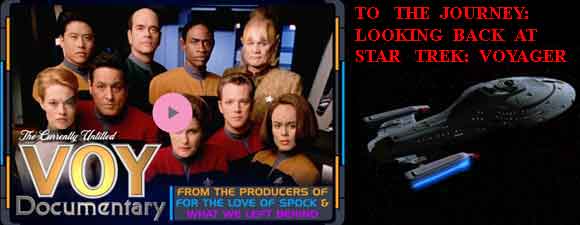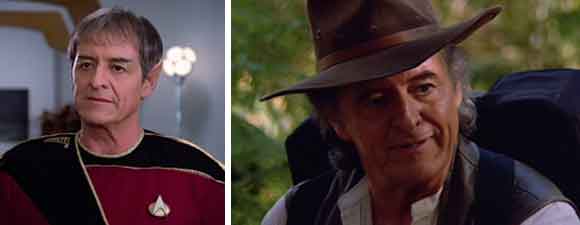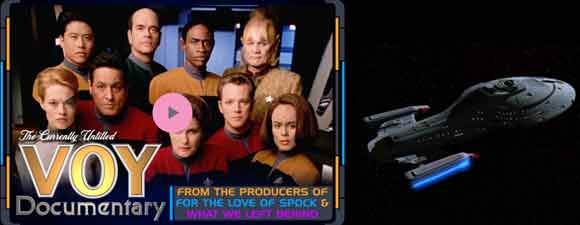Retro Review: Time and Again
7 min readJaneway and Paris get caught in a subspace fissure and thrown back in time one day before a cataclysm that will wipe out all life on a planet.
Plot Summary: At the same moment that Voyager is rocked by a shock wave from an explosion, Kes wakes with a vision of the inhabitants of a dying world. When Voyager scans the nearby planet, the crew finds that the entire population has been killed by a massive polaric energy discharge. During the investigation, Janeway and Paris fall into a subspace rift and find themselves in the past, hours before the disaster. While Chakotay orders Kim and Torres to find a way to communicate with the missing crewmembers, Janeway and Paris disguise themselves as natives and attempt to discover whether they can use the polaric energy conduits that power the planet to get them back to their own time. Paris wants to warn the people they meet of the impending disaster, but Janeway tells him that the Prime Directive forbids them from interfering. Then they are accidentally involved in a skirmish between the authorities guarding the energy facilities and dissidents who oppose the dangers of polaric energy, and are captured by the dissidents, who believe they are spies from the government. After Janeway learns that the dissidents intend to move up the time of their planned intervention to moments before the disaster, she realizes that Voyager’s arrival may already have disrupted the planet’s timeline by forcing the dissidents to rush a planned act of sabotage. Believing that the dissidents’ intervention must be the cause of the explosion, she tries to warn the authorities. Paris is shot in the ensuing struggle. Following the dissidents into the power facility, Janeway tries to stop them from accessing the planetary power supply. At that moment, Torres activates an energy beam to try to locate Voyager’s missing crewmembers through the subspace fissure. Janeway realizes that her own crew’s rescue attempt will cause the polaric energy discharge and uses her phaser to cut off the beam. As subspace fractures, the timeline resets, and no one remembers the incident except Kes, who asks to see the thriving planet on the viewscreen to prove that her vision was only a nightmare.
Analysis: As much as I enjoy the character development in Voyager‘s early episodes, it was pretty silly of the writers to kick off the show with two time travel paradoxes, particularly this second one in which all the positive crew interactions are erased as the explosion timeline disappears. All that remains canonically is Paris being a selfish player who doesn’t take Kim’s relationship with his girlfriend seriously, and Kes having supernatural gifts that unfortunately resemble some of the more ludicrous empathic powers of Deanna Troi. Overall, nearly everything about “Time and Again” feels like a Next Gen script repurposed for Voyager, right down to the captain being annoyed by a meddling child and the first officer and most logical crewmember having an argument about the captain’s interpretation of the Prime Directive. Some of the more obvious issues that might come up for discussion, such as Chakotay’s unswerving focus on retrieving the captain against whom several of his Maquis crewmembers would like to mutiny and the lieutenant whom Chakotay considers a self-interested mercenary, don’t get a moment of attention. Janeway’s recitation of the purpose of the Prime Directive sounds just like what Picard would say; there’s no trace of Kirk’s sense of personal responsibility and belief that if he’s in a position to avert a disaster, perhaps that’s what he’s meant to do. Chakotay, too, very much resembles Picard in command in this story, and as much as I like that he listens to everyone on the crew, even Kes and her irrational-sounding intuitions, it’s hard to see where he developed such a style in the Maquis, where there surely wasn’t time to sit down and come to a consensus before every firefight or act of sabotage. I get the impression that the writers threw broad outlines at the actors and hoped that the performances would fill in the gaps, which might work with really strong, original, action-packed science fiction stories but doesn’t work so well in talky episodes where even the aliens look and act like humans.
Which is not to say that I don’t really enjoy these early episodes, many of which are among my favorites despite the anomalies of the week. There’s immediate, believable chemistry among most of the cast members, something it took nearly a full season for Next Gen to develop and was spotty on Deep Space Nine until the writers had figured out which of the station’s inhabitants made for valuable recurring guest stars. I may not like Paris focusing on snagging the Delaney Sisters before someone else gets to them, but I do appreciate seeing him take a bullet for a child, and he and Kim have a nice rapport in their scenes together. It’s also nice to see Kim and Torres working together on a scientific problem, since their previous interaction at the hands of the Caretaker mostly involved her trying to pump him up and him trying to calm her down. There’s the complete delight of getting to know the Doctor, who makes it clear in “Time and Again” that he does, in fact, have a programmed sense of humor and his sarcasm is not just a quirk of his speech patterns. “It seems I’ve found myself on the Voyage of the Damned,” he announces upon learning that the captain is missing, after which he assures Kes – whose species he has never encountered before – that she has a lovely brain. The crew spends so much time alternately being relentlessly perky, as if they weren’t lost 70,000 light years from home, and being unhappy/afraid/troubled, which could happen to anyone who kept bumping into spatial anomalies, that it’s a pleasure to have one character who’s snarky and aggrieved purely by nature. The tension between Chakotay and Tuvok is interesting to watch since it will never completely go away; their personal styles and priorities are just too different, and they’re a bit competitive about guessing what Janeway would do, since Tuvok would like her to be a captain who prioritizes Starfleet values while Chakotay always tends to put people and their suffering above the letter of the law.
At this early stage, Neelix and his bombast remain a bit of an irritant, and it’s hard to know what to make of Kes (“I felt a great disturbance in the Force, as if millions of voices suddenly cried out in terror and were suddenly silenced”). I feel like most of what I like about her can be credited to Jennifer Lien’s understated performances, not to her scripted dialogue. It’s nice that Chakotay doesn’t dismiss her extraordinary abilities until he has some proof that they’re genuine, but it’s also not clear how listening to her helps him or the crew. Which leaves Janeway, who has a decidedly mixed outing. Yes, I love a captain who’s hands-on enough to go on away missions; no, I don’t think it’s very smart to enter potentially life-threatening situations when her top priority is supposed to be finding a way to get her crew home. It’s a pleasure to watch her on the planet, first trying to solve the scientific problem of their time displacement, then trying to talk her way around the dissidents and government officials, and finally having to work on her own after Paris’s injury as she slowly comes to realize that her own crew may be responsible for the disaster that levels a planet. Her decision-making process is a lot like the one in “Caretaker,” in which she’s aware of the Prime Directive but also aware that merely by being there, she and her people are already involved in events that could end in a holocaust. Janeway’s behavior when no one on her crew can see her is very much like her behavior when they can – she’s not concerned about her ability to defend herself, she doesn’t look for backup, and she has no problem giving orders to aliens, whether friends or foes. It may be a fairly silly storyline, which makes Janeway look more silly than one would hope for spending time and resources getting involved – you’d think by now she’d start to realize that any attempt to study a situation may constitute interference – but she acquits herself well during the action. But without any sort of payoff, even a momentary discussion of whether volatile polaric ions could help Voyager get home, “Time and Again” ends up feeling like waste of time and energy.







Dumbest time paradox ever! Voyager crew explores a dead planet, then encounters an alien race, then wind up nearly destroying the planet, then actually saving the alien race, resulting in their not even having the encounter to begin with. Yeek! Absolutely no sense at all!!!
I’d run out of fingers on both hands if I tried to tally the number of Voyager episodes that ended up never actually happening.
If you don’t understand where Chakotay learned to act like a Starfleet first officer while he was in the Maquis, it’s because he didn’t – he learned it in Starfleet. He was a full-fledged commander in the service before leaving the join the Maquis.
I’m not clear on to what part of the review this is responding.
Never mind the fact that there’s nothing preventing the planet from being destroyed a day or a year later in the same way.
Utter horse shit.
<3
An apt self-description. Is that the best you’ve got?
“Chakotay, too, very much resembles Picard in command in this story…”, …he listens to everyone on the crew…”, “…it’s hard to see where he developed such a style in the Maquis…”
Hey now, the guy obviously has some personal issues to work out. No need to hurt his feelings too!
“I may not like Paris focusing on snagging the Delaney Sisters before someone else gets to them, but I do appreciate seeing him take a bullet for a child, and he and Kim have a nice rapport in their scenes together.”
Wait, what’s wrong with Paris liking the Delaney sisters?
Such ma titties!
Come on now, you don’t actually think Michelle slows herself down by remembering little things like established facts about character histories do you?
It might have been interesting to show Chakotay having to relearn old habits, while simultaneously figuring out a middle group for handling his old Maquis comrades and the Starfleet crew under his command. But then, “it might have been interesting” is kind of Voyager’s mantra.
I know most ”time paradox” stories just don’t make any sense, but I’m a fan of the genre. Can’t help it. This one was entertaining enough. My rating: 7/10.